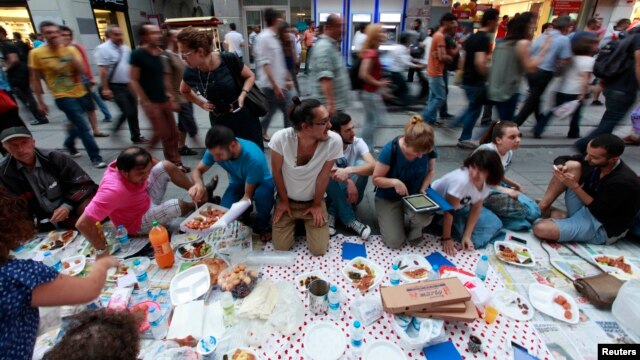M WAQAR..... "A man's ethical behavior should be based effectually on sympathy, education, and social ties; no religious basis is necessary.Man would indeed be in a poor way if he had to be restrained by fear of punishment and hope of reward after death." --Albert Einstein !!! NEWS,ARTICLES,EDITORIALS,MUSIC... Ze chi pe mayeen yum da agha pukhtunistan de.....(Liberal,Progressive,Secular World.)''Secularism is not against religion; it is the message of humanity.'' تل ده وی پثتونستآن
Tuesday, July 16, 2013
Ramadan Leads to Demonstrations in Turkey
Ramadan observances in Turkey are quickly becoming a catalyst for anti-government protests. Large public Iftar dinners that take place at the end of daily fasting, and are designed to protest the government, are being organized by self-described "Anti-Capitalist Muslims".
The Islamic fasting month of Ramadan has seen anti-government protesters adopt a new strategy - gathering on the city’s main shopping street for Iftar, the meal that breaks the day of fasting.
Just a few-hundred meters from the site of weeks of anti-government unrest at Gezi Park, demonstrators sitting on newspapers shared food as riot police backed by armored cars looked on.
One protestor, who did not want to be identified, believed the dinners send a powerful message.
"People have something to say and people have problems with the government, this pressure of the government is not something acceptable. And having the Iftar together, from all kinds of people, from different levels of society, different thoughts, different feelings is the best way to impress themselves against this pressure of the government," he said.
The protest dinners are organized by a group calling itself "Anti-Capitalist Muslims." Group leader Ihsan Eliacik accused the ruling Islamist AK Party of trying to divide Turks.
He said charges by the prime minister that anti-government protests were against religion were false, and "we are the ones defending religion." He said "the only division in Turkey is between those who seek and receive benefits from those in power and those who do not."
The Anti-Capitalist Muslims are protesting what they say is the ruling AK Party's party’s increasingly ostentatious behavior and the enrichment of its members. It has protested at Iftar dinners held at luxury hotels that it says are attended by government supporters and ministers.
The author of the book “Islam Without Extremes”, Mustafa Akyol, said the group was an alternative to the ruling Islamists and the opposition secularists.
"Maybe a bit like the liberation theology in Latin America, in the way they understand religion. So they are not a big group, their supporters are small, and I do not expect them to be turning into a larger political reality. But they are adding color to the discussion and I am glad they are out there, showing that there are not just two monolithic camps, but there is more diversity actually in society," said Akyol.
According to the government's statistics the divide between rich and poor has grown significantly, despite record economic growth during its decade long rule.
Political scientist Yuksel Taskin of Istanbul’s Marmara University said the Anti-Capitalist Muslim message of combining religion and social justice could find fertile ground in Turkey.
"They strongly challenge the AK Party's direct claim that they represent Islam," said Taskin. "They have a potential among youth. Certain marginal ideas can find some room in universities and gradually they may actually pass to other sections of society. This is generally what happens in Turkey. Our economy has grown four times, but ordinary shopkeepers and workers they are aware they are not benefiting from this. This increases the attractiveness of social Islam. Because people are quite religious in Turkey, so they like when religion and social concerns comes together."
With the Turkish economy showing signs of slowing, and unemployment edging higher, along with continuing anti-government protests, observers warn the message of the Anti-Capitalist Muslims could become more than just an irritant to Prime Minister Recep Tayyip Erdogan, when he faces national elections next year.
Subscribe to:
Post Comments (Atom)

No comments:
Post a Comment